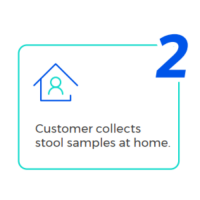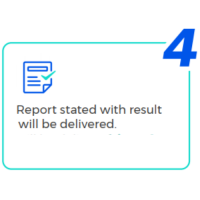
A recommended advanced test by
National Comprehensive Cancer Network (NCCN) Guideline for Patients: Colorectal Cancer Screening

Colorectal cancer is a type of cancer that affects colon or rectal parts of your digestive system. It usually starts as a small polyps on the inner lining of colon or rectum, where polyps grow over time and may become cancerous.
Generally, it takes around 5-10 years for a tumor to develop into colorectal cancer.

Colorectal cancer ranks as second most common cancer, and third deadliest cancer in Malaysia in year 2020, following after breast cancer and lung cancer.
(Source: GLOBACAN 2020, WHO)

More than 70% patients are diagnosed during late stage (Stage III and Stage IV), and this pattern is observed equally among both male and female.
(Source: MNCR Report 2007-2011, MOH)

Risk of developing colorectal cancer significantly increases with advancing age, where majority of cases are diagnose among individuals of age 50 years old and above.
(Source: MNCR Report 2007-2011, MOH)

(Source: National Strategic Plan for Colorectal Cancer 2021-2025, MOH)
Colorectal cancer patient has higher chances to cure and survive if diagnosed at early stage (stage I and II) compared to late stage (stage III and IV).
Late diagnosis of colorectal cancer can be due to some factors: infrequent check-up and late presentation of colorectal cancer’s signs and symptoms.
COLOTECT is a non-invasive, highly sensitive test for colorectal cancer (CRC) and precancerous lesions, facilitating early screening and detection of colorectal cancer.
Using advanced multi-target stool DNA testing technology, COLOTECT detects abnormal DNA biomarkers from your stool and assess your current risk for colorectal cancer.
It is common for colon cells on colon linings to shed onto stool during bowel movement. Same goes to cancer cells.
COLOTECT works by collecting and extracting the DNAs of normal cells and cancer cells that are shed on your your stool samples. Three abnormally-methylated cancer DNA marker genes ─ SDC2, ADHFE1, and PPP2R5C which closely associated with colorectal cancer progression are analyzed to tell your risk of having colorectal cancer.



Sample collection process is designed with privacy and convenience in mind.
Customers can collect stool samples in the comfort of their homes and mail samples back to us.








An user guide will be provided to you.

A positive test result indicates that you may have colorectal cancer and/or advanced adenoma.
You are recommended to follow up with your doctors and proceed to diagnostic procedures with colonoscopy.

A negative test result indicates that you has low possibility of colorectal cancer and/or advanced adenoma.
Maintaining a healthy lifestyle to keep your colorectal cancer risk low. You can schedule your next screening after 3 years.
Get your COLOTECT testing now!
1) Sung, H., Ferlay, J., Siegel, R. L., Laversanne, M., Soerjomataram, I. et al.. (2021). Global cancer statistics 2020: GLOBOCAN estimates of incidence and mortality worldwide for 36 cancers in 185 countries. CA: a cancer journal for clinicians, 71(3), 209-249.
2) Azizah A, Hashimah B, Nirmal K, et al. Malaysia National Cancer Registry Report 2012-2016. National Cancer Institute Ministry of Health Malaysia; 2019. Report No. MOH/P/IKN/05.19 (AR).
3)Azizah, A. M., Nor Saleha, I. T., Noor Hashimah, A., Asmah, Z. A., & Mastulu, W. (2016). Malaysian national cancer registry report 2007-2011. National Cancer Institute, 228.
4) Ministry of Health Malaysia. Clinical Practice Guideline for the Management of Colorectal Carcinoma. 2017.4)
5) Fang, Y., Peng, J., Li, Z., Jiang, R., Lin, Y., Shi, Y. et al. (2022). Identification of Muti-Omic Biomarkers from Fecal DNA for Improved Detection of Colorectal Cancer and Precancerous Lesions. medRxiv, 2022-11